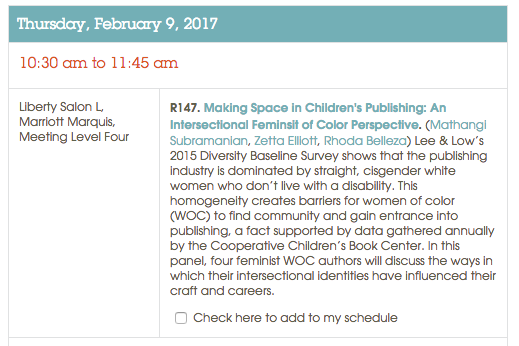Zetta Elliott's Blog, page 30
March 29, 2017
hurry up and wait
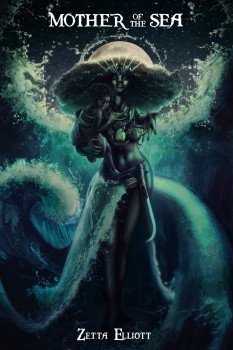 I’ve got peak sensitivity this week. Woke up irritated by the bird singing outside my window. Went for a long walk around the park and the sunshine did help—so did the chocolate I ate as soon as I got home. Now I’m watching a Law & Order marathon and just saw an episode I’d never seen before! So maybe I’m coming out of this funk. I’ve got too many open tabs in my life right now. My inbox is empty but I’ve got taxes to file, which means there’s a stack of receipts, 1099s, and pay stubs that needs my attention. My editor hasn’t responded to my request for help, so I’ve decided to go ahead and finish this short story even though I’m over the word limit—again. If he doesn’t like what I’ve done, I’ll have to develop yet another pitch. I want to use a certain font for the cover of Mother of the Sea but can’t reach the designer and it’s listed as “free for personal use.” I’m selling this book, so that makes it professional or commercial use. If he doesn’t respond soon, I’ll have to find a substitute font and have the cover redesigned because otherwise I’m risking potential legal action. Thought I found two experts to proof the book for me but one never responded and the other had to pull out due to time constraints. So now I’m trying to line up more readers with expertise in the Yoruba language and Ifá religion. Not a crisis, but it does mean I won’t have the book out by April 1st. I’ve ordered printed proofs but I’m heading to NC tomorrow so I won’t be here when they arrive. I just need to slow down and stop trying to rush for no reason (other than my obsessive drive to wrap things up). SFF legends Nnedi Okorafor and Nalo Hopkinson both shared the cover on Twitter, which I thought was incredibly generous. The response from their followers was really encouraging but that enthusiasm won’t expire if the book comes out a week later than planned. Right?
I’ve got peak sensitivity this week. Woke up irritated by the bird singing outside my window. Went for a long walk around the park and the sunshine did help—so did the chocolate I ate as soon as I got home. Now I’m watching a Law & Order marathon and just saw an episode I’d never seen before! So maybe I’m coming out of this funk. I’ve got too many open tabs in my life right now. My inbox is empty but I’ve got taxes to file, which means there’s a stack of receipts, 1099s, and pay stubs that needs my attention. My editor hasn’t responded to my request for help, so I’ve decided to go ahead and finish this short story even though I’m over the word limit—again. If he doesn’t like what I’ve done, I’ll have to develop yet another pitch. I want to use a certain font for the cover of Mother of the Sea but can’t reach the designer and it’s listed as “free for personal use.” I’m selling this book, so that makes it professional or commercial use. If he doesn’t respond soon, I’ll have to find a substitute font and have the cover redesigned because otherwise I’m risking potential legal action. Thought I found two experts to proof the book for me but one never responded and the other had to pull out due to time constraints. So now I’m trying to line up more readers with expertise in the Yoruba language and Ifá religion. Not a crisis, but it does mean I won’t have the book out by April 1st. I’ve ordered printed proofs but I’m heading to NC tomorrow so I won’t be here when they arrive. I just need to slow down and stop trying to rush for no reason (other than my obsessive drive to wrap things up). SFF legends Nnedi Okorafor and Nalo Hopkinson both shared the cover on Twitter, which I thought was incredibly generous. The response from their followers was really encouraging but that enthusiasm won’t expire if the book comes out a week later than planned. Right?
Time for more chocolate otherwise I might throttle the neighbor’s dog to make it stop barking…
March 18, 2017
success
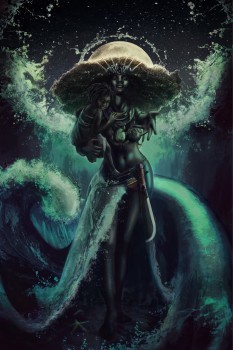 Last weekend I was feeling a little run down; it was bitterly cold so I threw on a warm sweater and went to a women’s tea at Weeksville. Our moderator for the morning asked us to start by reflecting on the moment when we knew success was possible for Black women. I didn’t grow up around many Black women; I loved my female relatives but success seemed like something only a celebrity could claim—I didn’t know any Black women doctors or lawyers or others kinds of professionals. If success in my mind meant wealth and fame, then my idea of a successful woman was Whitney Houston—the first young Black woman I ever saw on the cover of a mainstream magazine (Seventeen). We compared notes in our small groups and then came back together to share our reflections. I commented that today, success to me has a lot to do with context and community. It’s important to define success for yourself and not compare yourself to others, but it’s equally important to make sure that your personal achievements somehow serve your community. Even though I wasn’t dressed for success that particular day, I was named a “Woman of Weeksville” and received a lovely bouquet and certificate of recognition. The next day I woke up with a cold and it’s with me still,
Last weekend I was feeling a little run down; it was bitterly cold so I threw on a warm sweater and went to a women’s tea at Weeksville. Our moderator for the morning asked us to start by reflecting on the moment when we knew success was possible for Black women. I didn’t grow up around many Black women; I loved my female relatives but success seemed like something only a celebrity could claim—I didn’t know any Black women doctors or lawyers or others kinds of professionals. If success in my mind meant wealth and fame, then my idea of a successful woman was Whitney Houston—the first young Black woman I ever saw on the cover of a mainstream magazine (Seventeen). We compared notes in our small groups and then came back together to share our reflections. I commented that today, success to me has a lot to do with context and community. It’s important to define success for yourself and not compare yourself to others, but it’s equally important to make sure that your personal achievements somehow serve your community. Even though I wasn’t dressed for success that particular day, I was named a “Woman of Weeksville” and received a lovely bouquet and certificate of recognition. The next day I woke up with a cold and it’s with me still, 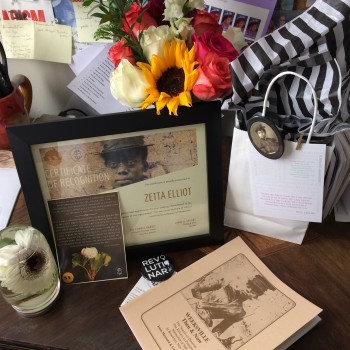 which is my excuse for holing up in my hotel room here in Denver. It’s 80 degrees outside but I haven’t gone out to enjoy the unseasonable weather. I have 3 panels coming up and figure I’d better sit at my vendor’s table for at least an hour. Yesterday I had a great group of kids and adults for my Mini(on)Con presentation followed by a fantastic conversation about kid lit with my co-panelist Stan Yan and three conference participants. No one came to our reading afterward so I chatted a while with my co-panelists about writing as a parent and then called it a day. Is my first Con a success? I sold four books yesterday and may or may not sell that many today, which means lugging the bulk of them back home. But tomorrow I see a friend who got me a ticket to the Star Wars costume exhibit at the Denver Art Museum. And then I saw a commercial for a Vikings exhibit at the Museum of Nature & Science, so I booked a morning ticket for that, too! (to quote my friend Martine, I’m “a geek with a plan”) I may end up spending 8 hours at the airport but maybe I’ll finally get some writing done. Connecting with good people, learning about Vikings, trying something new in a new place = success to me. Every day my illustrator Christina sends me amazing updates; she’s almost done coloring the cover art for Mother of the Sea! The hotel gift shop had Sudafed so I’m sufficiently medicated, if red-nosed. I’m watching back-to-back flip shows on HGTV but I’m also clearing my inbox and prepping for next week’s trip to NC. My first panel starts in thirty minutes so I better go. Folks here are friendly and dressed in amazing steampunk costumes—even the kids! I love it when geeks come together to celebrate what they love …
which is my excuse for holing up in my hotel room here in Denver. It’s 80 degrees outside but I haven’t gone out to enjoy the unseasonable weather. I have 3 panels coming up and figure I’d better sit at my vendor’s table for at least an hour. Yesterday I had a great group of kids and adults for my Mini(on)Con presentation followed by a fantastic conversation about kid lit with my co-panelist Stan Yan and three conference participants. No one came to our reading afterward so I chatted a while with my co-panelists about writing as a parent and then called it a day. Is my first Con a success? I sold four books yesterday and may or may not sell that many today, which means lugging the bulk of them back home. But tomorrow I see a friend who got me a ticket to the Star Wars costume exhibit at the Denver Art Museum. And then I saw a commercial for a Vikings exhibit at the Museum of Nature & Science, so I booked a morning ticket for that, too! (to quote my friend Martine, I’m “a geek with a plan”) I may end up spending 8 hours at the airport but maybe I’ll finally get some writing done. Connecting with good people, learning about Vikings, trying something new in a new place = success to me. Every day my illustrator Christina sends me amazing updates; she’s almost done coloring the cover art for Mother of the Sea! The hotel gift shop had Sudafed so I’m sufficiently medicated, if red-nosed. I’m watching back-to-back flip shows on HGTV but I’m also clearing my inbox and prepping for next week’s trip to NC. My first panel starts in thirty minutes so I better go. Folks here are friendly and dressed in amazing steampunk costumes—even the kids! I love it when geeks come together to celebrate what they love …
March 9, 2017
new horizons
I finished my story on Sunday and worried I might be in a funk all this week. But the cure for post-project depression is often to start a new project, and that’s what I did. Partly because my 10,000-word novelette isn’t what my client is looking for, so I need to develop a new pitch (done) and submit a proper 3,000-word short story (working on it). And partly because I felt Mother of the Sea was too good to discard, so I found an amazing illustrator and checked to see how it would look as a book. And e-book probably makes more sense but I’m not a digital reader and prefer something I can hold and share with others (60-page 6×9″ book = $7). E-books matter because I want to connect with readers outside the US and with international postage rates steadily rising, digital books ensure affordable, instant access. For The Ghosts in the Castle I’ve been sending out a link to the digital proof because mailing books to the UK is ridiculously expensive. When I submitted my interview responses to The Voice, they asked when I’d be in the UK. I said I hoped to cross the pond this spring and now that seems more likely because apparently I misread my contract; it’s for 2 books but I thought the advances would be paid consecutively, not concurrently. I was wrong! So I could do the right thing and pay last year’s taxes, pay down my credit cards, and tuck some away in my savings account, or…I could look into a week-long trip to London. I’m not sure how to find schools willing to pay for an author visit, but I’m going to make a plan. Would UK kid lit scholars want to hear me talk about racism in US publishing? KT Horning of the CCBC posted this depressing graphic on Twitter this week:
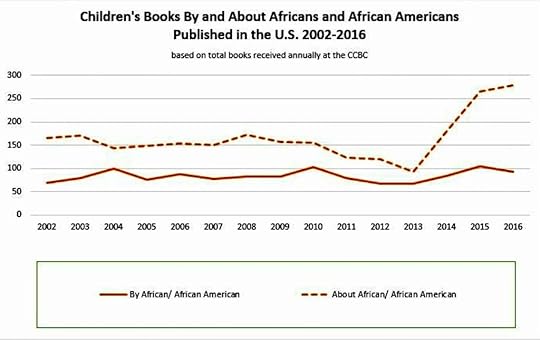 Black History Month isn’t until October in the UK but maybe I could partner with some Black British authors and coordinate a panel to compare struggles in the US and UK. It’s time to get creative! I’m so grateful to the Black women editors at The Voice who gave me a chance to talk about my new book:
Black History Month isn’t until October in the UK but maybe I could partner with some Black British authors and coordinate a panel to compare struggles in the US and UK. It’s time to get creative! I’m so grateful to the Black women editors at The Voice who gave me a chance to talk about my new book:
Q: What would you like children to take away from reading this book?
A: My goal is always to empower rather than to embitter youth. At the same time, I want them to think about ethics, and I find that kids have a keen sense of justice. The past can’t be undone, but the characters in Ghosts find a way to “liberate” an African child by reminding him of his cultural heritage. I hope children think about what it means to belong; I hope they ask the elders in their families and communities to share their origin stories. I hope children—especially kids of colour—understand that magic can happen to anyone, anywhere! It’s time to look beyond wands and wizards…
You can read the complete interview here.
Tomorrow I present at a school for the third time in a year; the 4th and 5th graders have seen my two slideshows so it’s time to develop a new book talk about Ghosts. And once I’ve got that new slideshow, I’ll be ready to hit the road…
March 5, 2017
seasick
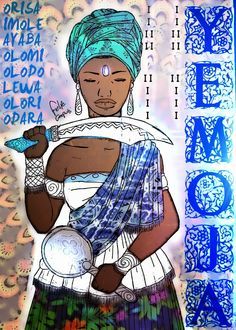 I hit rock bottom last week. Even though I was averaging a thousand words a day, I wasn’t getting any closer to finishing “A Light in the Deep.” When I write for myself, I don’t worry about word length; I let the story take me wherever it wants to go. But when I write for hire, it’s my job to give the client what they want and this project called for a 3000-word story about a slave ship destroyed by a mermaid (actually, by Yemoja, depicted here by Felipe Caprini). I could have cried on Friday but I got some cake and got over myself. Now I’m nearing 10K words but I’ve only got a few more paragraphs to write. I’m pretty sure my client isn’t going to want this ridiculously long—and late—story, so that means I’ll be pitching and writing another story this week. That also means I’ll need to figure out what to do with what I’ve got. Self-publish it as a digital story or submit it to a SFF journal? It’s intended for a middle school audience, but maybe it would still appeal to adults? There are machetes and beheadings…In my mind I’ve been composing my apology email to my editor: “The good news is, the story’s finally done! The bad news is, it’s 10K words. The good news is, I can write a thousand words a day so writing the story you WANT shouldn’t take me too long…”
I hit rock bottom last week. Even though I was averaging a thousand words a day, I wasn’t getting any closer to finishing “A Light in the Deep.” When I write for myself, I don’t worry about word length; I let the story take me wherever it wants to go. But when I write for hire, it’s my job to give the client what they want and this project called for a 3000-word story about a slave ship destroyed by a mermaid (actually, by Yemoja, depicted here by Felipe Caprini). I could have cried on Friday but I got some cake and got over myself. Now I’m nearing 10K words but I’ve only got a few more paragraphs to write. I’m pretty sure my client isn’t going to want this ridiculously long—and late—story, so that means I’ll be pitching and writing another story this week. That also means I’ll need to figure out what to do with what I’ve got. Self-publish it as a digital story or submit it to a SFF journal? It’s intended for a middle school audience, but maybe it would still appeal to adults? There are machetes and beheadings…In my mind I’ve been composing my apology email to my editor: “The good news is, the story’s finally done! The bad news is, it’s 10K words. The good news is, I can write a thousand words a day so writing the story you WANT shouldn’t take me too long…”
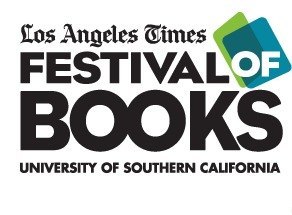 I’m honored to have been invited to participate in the LA Times Book Festival! I’ve never been to Los Angeles and though I have to pay my way to the festival, I’m still excited and hope I can fit in a school visit while I’m in town. I found out this week that I didn’t get the Sweden residency, so I’m reconsidering this year’s writing priorities. I’m not giving up on my Viking novel, but it’s no longer at the top of the queue. When Prof. Karen Sands-O’Connor reviewed The Ghosts in the Castle, she tweeted that she hoped Zaria would return to England and meet more Black Britons—and that’s a tempting proposition! I’ve already checked prices and might try to hop across the pond when my advance check from Random House arrives. I also checked prices of flights to New Zealand but think that trip will have to wait a while. Karen’s review of Ghosts is fantastic; in “Ghosts of No Nation: Forgotten Histories Revealed in Children’s Literature” she considers my fictional narrative alongside David Olusoga’s Black and British: A Forgotten History.
I’m honored to have been invited to participate in the LA Times Book Festival! I’ve never been to Los Angeles and though I have to pay my way to the festival, I’m still excited and hope I can fit in a school visit while I’m in town. I found out this week that I didn’t get the Sweden residency, so I’m reconsidering this year’s writing priorities. I’m not giving up on my Viking novel, but it’s no longer at the top of the queue. When Prof. Karen Sands-O’Connor reviewed The Ghosts in the Castle, she tweeted that she hoped Zaria would return to England and meet more Black Britons—and that’s a tempting proposition! I’ve already checked prices and might try to hop across the pond when my advance check from Random House arrives. I also checked prices of flights to New Zealand but think that trip will have to wait a while. Karen’s review of Ghosts is fantastic; in “Ghosts of No Nation: Forgotten Histories Revealed in Children’s Literature” she considers my fictional narrative alongside David Olusoga’s Black and British: A Forgotten History.
Britain often seems through its literature and other cultural production to be a place where whiteness is not only dominant, but sometimes exclusive, both to its own citizens and to the global tourists and consumers of children’s books. Elliott’s book takes a step toward changing the image of Britain—but based on David Olusoga’s history, Zaria is going to have to return and find more ghosts to set free from invisibility. Only then will they move from being ghosts of no nation, to belonging to us all.
I’m looking forward to sharing Ghosts and my other historical fantasy novels with young readers in Denver later this month at Mini(on)Con on Friday the 17th (I present at 1 and 1:30). This is the last AnomalyCon and I’m excited about meeting so many amazing SFF writers. I don’t think most Cons are this inclusive so it’s a shame this is their last year but I’m glad I get to participate. I’ll also get to hang out with writer friend Carleen Brice and see the Star Wars costume exhibit at the Denver Museum of Art! These are the panels I’ll be on at AnomalyCon:
Friday 7pm: “Stories We Tell Our Children”
Friday 8pm: “Bedtime Stories” (reading)
Saturday 3pm: “We Need Diverse Books”
Saturday 5pm: “The Female Gaze Is Coming for You”
Saturday 6pm: “Based in Dreams”
Speaking of conferences, have you registered for Kweli’s The Color of Children’s Literature conference? If you’re a Native or PoC writer for kids/teens, you don’t want to miss this opportunity to network with industry professionals and aspiring writers. I’ve never seen anything like it; most kid lit events are mighty White, but not Kweli—for once, WE comprise the majority! It’s empowering and energizing—you can even get your manuscript critiqued if you apply early.
February 21, 2017
promised land
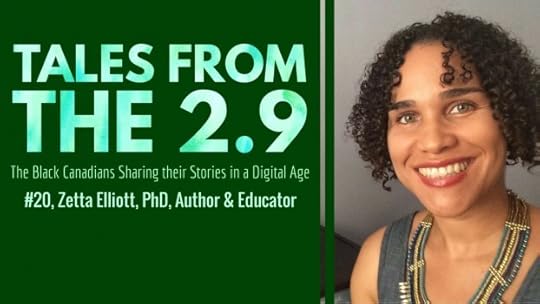 Casey Palmer, Canadian Dad, has been posting profiles of Black Canadians all month long for his second annual Tales from the 2.9. Blacks make up less than 3% of the population in the Great White North (or as Henry Louis Gates, Jr. puts it, “Black Americans are a nation. There are more of us in the US than there are people in the country of Canada”) and Casey is determined to shine a light on the movers and shakers. Canada is celebrating its 150th birthday so it’s vital that Black voices are part of the conversation. I’m honored to be included because I haven’t lived in Canada for a long time and don’t have such a rosy view of my country of origin. Here’s a bit of my profile:
Casey Palmer, Canadian Dad, has been posting profiles of Black Canadians all month long for his second annual Tales from the 2.9. Blacks make up less than 3% of the population in the Great White North (or as Henry Louis Gates, Jr. puts it, “Black Americans are a nation. There are more of us in the US than there are people in the country of Canada”) and Casey is determined to shine a light on the movers and shakers. Canada is celebrating its 150th birthday so it’s vital that Black voices are part of the conversation. I’m honored to be included because I haven’t lived in Canada for a long time and don’t have such a rosy view of my country of origin. Here’s a bit of my profile:
What does being Black Canadian mean to you?I’m proud to be Canadian. I’ve been critical of the country and the limited opportunities available to Black Canadians, but I start every author presentation here in the US by telling kids that I’m an immigrant from Canada. The Black Canadian identity is all about hybridity for me—I participate in multiple cultures and I’m the product of multiple histories, and that confounds many White Canadians who don’t understand intersectionality and like to imagine all Black people stepping off a boat or plane yesterday. Being a Black Canadian means never forgetting the sacrifices made by my Caribbean ancestors who gave up their status and professions in the 1950s to start from scratch in such a cold (and often hostile) place. Being a Black Canadian also means honouring my African American ancestors who came north hoping for a better life in the 1830s. The racism they encountered was so severe that it pushed them across the color line; my job as a Black Canadian writer living on the other side of that color line and the other side of the border is not to judge my ancestors but to tell the truth (as I see it) about “the promised land.”
February 17, 2017
feel the love
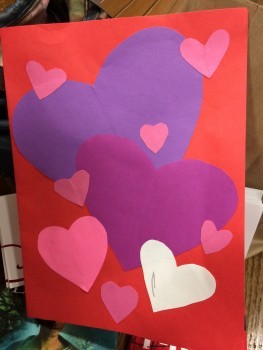 I didn’t stay home yesterday in observance of the immigrant strike; I had a half-day school visit in Bushwick and started my book talk for second graders with my usual pronouncement: “I’m an immigrant!” One little Black girl recoiled in horror and then I realized the kids didn’t know what an immigrant was. She relaxed once I explained that I’ve lived in the US for over 20 years but used to live somewhere else. Confusion and concern in a seven-year-old I understand, but the panic among adults is just irrational and the recent deportations are appalling. I’ve mostly stayed safe inside my “Brooklyn bubble” since the election, but last week I was in DC and this week I spent a couple of days in Baltimore. Both trips were fantastic and I came home feeling energized and very grateful for the good people in my life and their willingness to share their platform with me. Deb Taylor at the Enoch Pratt Free Library designed the perfect author visit—I had time to write in the hotel, we had a sumptuous dinner (and Deb let me eat most of the blueberry cobbler we shared for dessert), and then the next day I visited two high schools including Deb’s alma mater Western HS. The young women there had great questions and told me about their own novels-in-progress, and the students at Wervo HS later that day were just as engaged. Before leaving Baltimore I had time to meet with a writer friend and her family—they made me this lovely card and I left the city with a full heart.
I didn’t stay home yesterday in observance of the immigrant strike; I had a half-day school visit in Bushwick and started my book talk for second graders with my usual pronouncement: “I’m an immigrant!” One little Black girl recoiled in horror and then I realized the kids didn’t know what an immigrant was. She relaxed once I explained that I’ve lived in the US for over 20 years but used to live somewhere else. Confusion and concern in a seven-year-old I understand, but the panic among adults is just irrational and the recent deportations are appalling. I’ve mostly stayed safe inside my “Brooklyn bubble” since the election, but last week I was in DC and this week I spent a couple of days in Baltimore. Both trips were fantastic and I came home feeling energized and very grateful for the good people in my life and their willingness to share their platform with me. Deb Taylor at the Enoch Pratt Free Library designed the perfect author visit—I had time to write in the hotel, we had a sumptuous dinner (and Deb let me eat most of the blueberry cobbler we shared for dessert), and then the next day I visited two high schools including Deb’s alma mater Western HS. The young women there had great questions and told me about their own novels-in-progress, and the students at Wervo HS later that day were just as engaged. Before leaving Baltimore I had time to meet with a writer friend and her family—they made me this lovely card and I left the city with a full heart.
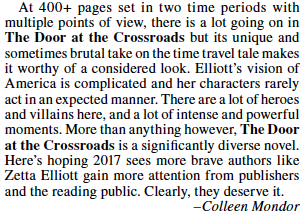 Colleen Mondor reviewed The Door at the Crossroads for Locus Magazine last year, and this month she wrote up a summary of her favorite 2016 YA reads. She concluded with Crossroads and I was both touched and honored by her words. Immigrant authors have a unique vision to share with their readers, and I’m grateful to allies like Colleen who are working to tear down the walls put up by gatekeepers in the publishing industry. Unfortunately, so far, Colleen’s advice to the “book gods” has largely gone unheeded. The CCBC has released their stats for 2016—no real progress for Black authors and illustrators:
Colleen Mondor reviewed The Door at the Crossroads for Locus Magazine last year, and this month she wrote up a summary of her favorite 2016 YA reads. She concluded with Crossroads and I was both touched and honored by her words. Immigrant authors have a unique vision to share with their readers, and I’m grateful to allies like Colleen who are working to tear down the walls put up by gatekeepers in the publishing industry. Unfortunately, so far, Colleen’s advice to the “book gods” has largely gone unheeded. The CCBC has released their stats for 2016—no real progress for Black authors and illustrators:
Of the approximately 3,400 books we received at the CCBC in 2016, most from U.S. publishers, here’s the breakdown*:
278 books had significant African or African American content
71 of these were by Black authors and/or illustrators
92 books were by Black authors and/or illustrators
21 of these had no visible African/African American cultural content)
237 books had significant Asian/Pacific or Asian/Pacific American content
75 of these were by authors and/or illustrators of Asian/Pacific heritage
212 books were by authors and/or illustrators of Asian/Pacific heritage
137 of these had no visible Asian/Pacific cultural content
55 books had significant First/Native Nations content
21 of these were by First/Native Nations authors and/or illustrators
22 books were by First/Native Nations authors and/or illustrators
1 of these had no visible First/Native Nations content
166 books had significant Latino content
58 of these were by Latino authors and/or illustrators
101 books were by Latino authors and/or illustrators
43 of these had no visible cultural content
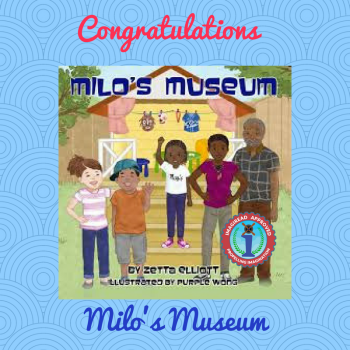 Tiffany Rachann, founder of Imagiread, has awarded Milo’s Museum the Imagiread seal of approval! Tiffany also developed a free supplement with discussion questions and activity ideas; you can even watch a video and hear Tiffany read the opening pages of the book! I’ve been wanting to make a video for Milo and this is just the inspiration I needed…
Tiffany Rachann, founder of Imagiread, has awarded Milo’s Museum the Imagiread seal of approval! Tiffany also developed a free supplement with discussion questions and activity ideas; you can even watch a video and hear Tiffany read the opening pages of the book! I’ve been wanting to make a video for Milo and this is just the inspiration I needed…
Teaching for Change has posted an important list of Afro-Latino titles for kids and teens; Max Loves Muñecas is included along with some other great titles–check them out. School Library Journal also published a list compiled by the Bank Street College of Education: “From Refugees to Voting Rights, Books to Inspire a Just, Inclusive Society.” A Wish After Midnight is in the section on Racism in Fiction.
Finally I signed, sealed, and delivered my contract with Random House today! To my surprise, beneath my signature I was asked to write my citizenship; I’m sure that’s for accounting purposes, but in today’s climate it gave me pause. I’m proud to be Canadian and I’m proud to be American. This immigrant author has a lot more stories to tell…
February 12, 2017
#AWP2017
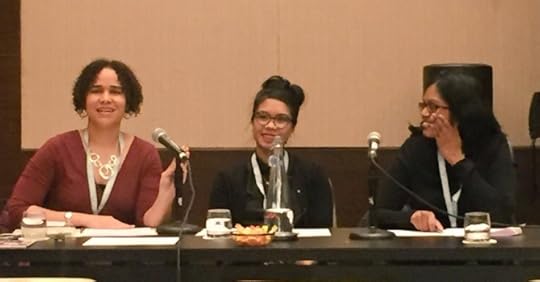 This weekend I’m taking two much-needed days of silence after participating in my first AWP (Association of Writers & Writing Programs) conference. I attempted to do AWP once before years ago—Nikky Finney invited me to present on a panel when the Cave Canem anthology The Ringing Ear came out years ago. But flight delays got me to the conference five minutes before my panel ended, so I didn’t even bother to take my seat with the three other poets. If I recall correctly, I went back to the hotel and didn’t check out the rest of the conference—and I did a fair bit of hotel-hiding this time around, too. I always thought of AWP as an event for poets, but it’s a huge gathering of writers in many different genres. Our panel on Thursday morning was really relaxed and engaging (thanks @PittWriters for snapping that photo), and we had a smart audience full of writers and educators. Afterward we connected with some young writers and then walked over to Busboys & Poets to have lunch. I’ve known Rhoda Belleza for a few
This weekend I’m taking two much-needed days of silence after participating in my first AWP (Association of Writers & Writing Programs) conference. I attempted to do AWP once before years ago—Nikky Finney invited me to present on a panel when the Cave Canem anthology The Ringing Ear came out years ago. But flight delays got me to the conference five minutes before my panel ended, so I didn’t even bother to take my seat with the three other poets. If I recall correctly, I went back to the hotel and didn’t check out the rest of the conference—and I did a fair bit of hotel-hiding this time around, too. I always thought of AWP as an event for poets, but it’s a huge gathering of writers in many different genres. Our panel on Thursday morning was really relaxed and engaging (thanks @PittWriters for snapping that photo), and we had a smart audience full of writers and educators. Afterward we connected with some young writers and then walked over to Busboys & Poets to have lunch. I’ve known Rhoda Belleza for a few 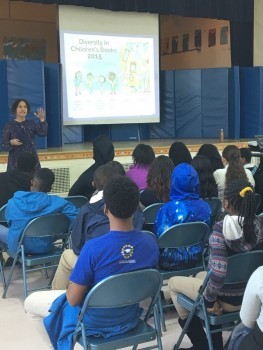 years now but this was our first time meeting Mathangi Subramanian; talking about becoming feminists and claiming the writer identity revealed just how much we have in common. AWP had me marveling, once again, over the ease with which women connect. I probably shouldn’t gender it that way, but for me, it’s always amazing how I can meet someone and in an instant feel such a close connection; we open up almost immediately and I don’t know if most men get to experience that kind of instant intimacy and trust. After lunch I went back to the convention center and caught the end of my friends’ panel on Black women performance poetry. Someone in the audience stood up during the Q&A and said, “You all are AMAZING?” And she was right—I’m so proud of my friends and grateful that knowing such amazing women means my world gets populated with the exceptional people they attract. I asked Deborah Menkart of Teaching for Change if she knew any schools that might like an author visit, and she connected me with Allyson Criner Brown who placed me in LaSalle-Backus Education Campus on Friday. Their TFC colleague, Maybelline McCoy, picked me up that morning and before we reached the end of the block, we were chatting like old friends. At least that’s how it felt to me! She took me out for lunch afterward we covered so much ground: our families, religion, the ancestors, healing rituals, academia, the books we needed as kids but never had…a few hours later I went back to that same restaurant (I had 3 delicious meals there in 2 days!) and met another friend whom I first met on Facebook. She’s a teacher and writer so we have lots in common, too. But Rachelle’s hopeful and I need to make more space for optimism right now. I’m not an especially open person and maybe that’s why it surprises me when connections happen so quickly. I work to make that happen in the classroom, and it means a lot when students tell me they can relate to something I’ve said or written about in my books. Maybe in-person connections surprise me because I spend so much time inside my head, or online, or hiding from the world in my apartment or some hotel. Tomorrow I get back on the train and head to Baltimore to visit two high schools on Tuesday as the guest of Deb Taylor at Enoch Pratt Free Library. Wednesday I have a Skype visit with grad students in Seattle, on Thursday I have a half-day school visit in Bushwick, and then things slow down as we enter Presidents’ Week. I need to work on my slave ship story but writing hasn’t come easy as of late. Guess I just have to push on through….
years now but this was our first time meeting Mathangi Subramanian; talking about becoming feminists and claiming the writer identity revealed just how much we have in common. AWP had me marveling, once again, over the ease with which women connect. I probably shouldn’t gender it that way, but for me, it’s always amazing how I can meet someone and in an instant feel such a close connection; we open up almost immediately and I don’t know if most men get to experience that kind of instant intimacy and trust. After lunch I went back to the convention center and caught the end of my friends’ panel on Black women performance poetry. Someone in the audience stood up during the Q&A and said, “You all are AMAZING?” And she was right—I’m so proud of my friends and grateful that knowing such amazing women means my world gets populated with the exceptional people they attract. I asked Deborah Menkart of Teaching for Change if she knew any schools that might like an author visit, and she connected me with Allyson Criner Brown who placed me in LaSalle-Backus Education Campus on Friday. Their TFC colleague, Maybelline McCoy, picked me up that morning and before we reached the end of the block, we were chatting like old friends. At least that’s how it felt to me! She took me out for lunch afterward we covered so much ground: our families, religion, the ancestors, healing rituals, academia, the books we needed as kids but never had…a few hours later I went back to that same restaurant (I had 3 delicious meals there in 2 days!) and met another friend whom I first met on Facebook. She’s a teacher and writer so we have lots in common, too. But Rachelle’s hopeful and I need to make more space for optimism right now. I’m not an especially open person and maybe that’s why it surprises me when connections happen so quickly. I work to make that happen in the classroom, and it means a lot when students tell me they can relate to something I’ve said or written about in my books. Maybe in-person connections surprise me because I spend so much time inside my head, or online, or hiding from the world in my apartment or some hotel. Tomorrow I get back on the train and head to Baltimore to visit two high schools on Tuesday as the guest of Deb Taylor at Enoch Pratt Free Library. Wednesday I have a Skype visit with grad students in Seattle, on Thursday I have a half-day school visit in Bushwick, and then things slow down as we enter Presidents’ Week. I need to work on my slave ship story but writing hasn’t come easy as of late. Guess I just have to push on through….
February 1, 2017
getting around the gatekeepers
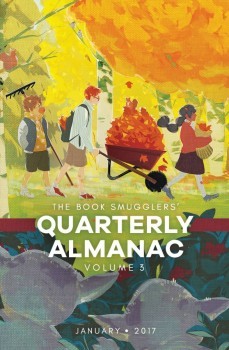 People around the world are waking up to the fact that a very small group of people holds way too much power over the rest of us. Whether it’s in politics or in publishing, gatekeepers determine what we’re able to access and the lack of transparency preserves the illusion of “free choice.” If you’re only given two options, how free are you really? I’ll be discussing these issues online and in person this month—hope you’ll join the conversation!
People around the world are waking up to the fact that a very small group of people holds way too much power over the rest of us. Whether it’s in politics or in publishing, gatekeepers determine what we’re able to access and the lack of transparency preserves the illusion of “free choice.” If you’re only given two options, how free are you really? I’ll be discussing these issues online and in person this month—hope you’ll join the conversation!
I’ve got a few links to share today. My essay, “Minstrelsy Is the New Black” is available now—get your copy of the latest Book Smugglers’ Quarterly Almanac! Ana and Thea started out blogging about the SFF books they love but they’re now publishing original content that’s far more inclusive than what the traditional industry produces. In a way, they got around the gatekeepers by creating their own platform and sharing it with diverse storytelling voices:
Collecting original short fiction, essays, reviews, and reprints from diverse and powerful voices in speculative fiction, THE BOOK SMUGGLERS’ QUARTERLY ALMANAC is essential for any SFF fan.
IN THIS VOLUME (JANUARY 2017): BECKY CHAMBERS, SHERRI L. SMITH, A.E. ASH, KATHERINE MACLEAN, NIGEL QUINLAN, ZETTA ELLIOTT, ALLIAH/VIC, KATE C. HALL, NICOLE BRINKLEY, ANA GRILO AND THEA JAMES
I’ve talked recently about bloggers who block self-published authors; The Book Smugglers have always opened their door to me and so has Cynthia Leitich Smith. I first appeared on her Cynsations blog back in 2009 and was thrilled to have a chance to discuss my latest novel THE GHOSTS IN THE CASTLE. Cynthia’s intern, Gayleen Rabakukk, came up with some fantastic questions—here’s one:
As an author/scholar how do your various roles inform one another? (Did this influence your decision to write this story for a MG audience?)
I wear a lot of different hats, but I definitely think about how the books I write could be used to start a conversation between kids and adults at home or in the classroom. My dissertation was on literary representations of lynching, so I’ve spent a fair amount of time thinking about trauma and its impact on Black people. I feel quite strongly that I have a responsibility to “teach the youth the truth” and that’s one reason I self-publish.
The Ghosts in the Castle is a book that likely would not appeal to corporate publishers and neither would Billie’s Blues (Rosetta Press, 2015), which gives lynching as one of the reasons for the Great Migration of African Americans out of the South. When I told my college students that I wanted to write a picture book about lynching, they were shocked. Yet many of those same students were furious that they’d never learned about lynching until they reached college. Children are taught about the Holocaust and some kids learn about slavery in the U.S., but many textbooks are sanitized or decontextualized.
There’s a real fear within the dominant group that if children know the ugly truth about the country’s history, they’ll become embittered and “unmanageable” (to borrow a term from Frederick Douglass). But I think young people are empowered by the truth, and so my challenge is to make events and figures from the past relevant to contemporary kids who think Harry Potter novels have taught them all they need to know about England.
Shanna Miles does it all—she’s an author, librarian, blogger, and BookTuber! Last month she ran a self-publishing series on her blog and she’s hosting a Twitter chat next week—join us! You can read my interview with Shanna here and Imani’s can be found here.
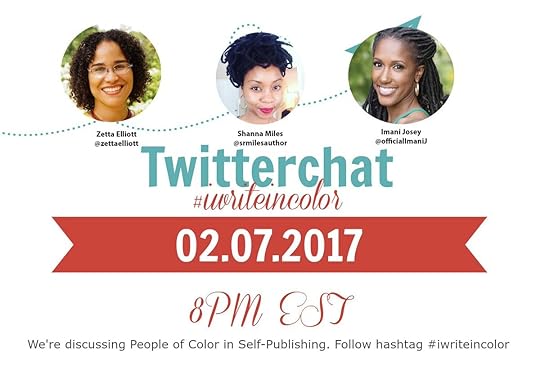 Next week I’ll be heading to DC for the annual AWP conference. I’m presenting with Rhoda Belleza and Mathangi Subramanian—if you’re attending the conference and are free Thursday morning, I hope you’ll check out our panel:
Next week I’ll be heading to DC for the annual AWP conference. I’m presenting with Rhoda Belleza and Mathangi Subramanian—if you’re attending the conference and are free Thursday morning, I hope you’ll check out our panel:
January 27, 2017
Diverse YA Fiction @ Booklist
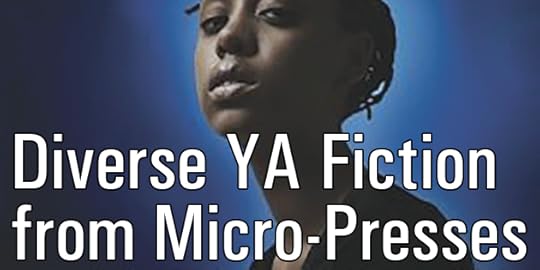 What a week! My head is spinning but this week has been both productive and rewarding. On Monday I turned in the final draft of an essay I was asked to write by the curator of the Doris McCarthy Gallery and the University of Toronto’s Scarborough Campus; I grew up not too far from there and my essay “The Perils of Proximity” will accompany the exhibit Northern Oracle by African American sculptor Heather Hart. I also turned in revisions for another essay, “Minstrelsy is the New Black,” which will appear in next month’s Book Smugglers Almanac. I successfully pitched a story about mermaids and the Middle Passage to a curriculum company, and I reached out to past clients who both invited me to return to their schools. This is the freelancer’s hustle! It’s dizzying and exhausting at times, but also exhilarating. So it’s nice to end the week by learning through a librarian friend that Booklist kept its word and launched a new column to bring attention to “micro-presses” including self-published authors. They even used the cover of Crossroads for their column header! Here’s Zara Rix’s review of my novel:
What a week! My head is spinning but this week has been both productive and rewarding. On Monday I turned in the final draft of an essay I was asked to write by the curator of the Doris McCarthy Gallery and the University of Toronto’s Scarborough Campus; I grew up not too far from there and my essay “The Perils of Proximity” will accompany the exhibit Northern Oracle by African American sculptor Heather Hart. I also turned in revisions for another essay, “Minstrelsy is the New Black,” which will appear in next month’s Book Smugglers Almanac. I successfully pitched a story about mermaids and the Middle Passage to a curriculum company, and I reached out to past clients who both invited me to return to their schools. This is the freelancer’s hustle! It’s dizzying and exhausting at times, but also exhilarating. So it’s nice to end the week by learning through a librarian friend that Booklist kept its word and launched a new column to bring attention to “micro-presses” including self-published authors. They even used the cover of Crossroads for their column header! Here’s Zara Rix’s review of my novel:
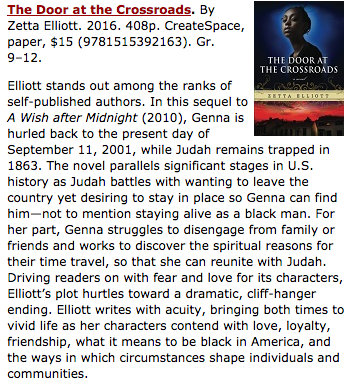
 Last spring I asked Booklist to reconsider their policy regarding self-published books. Their youth lit editor Dan Kraus agreed to try out an “inclusive indie” column, and my professor friends recommended graduate students to assume the role of reviewer. Months went by and I started to think the column would never appear, but this Booklist feature reaffirms my faith in humanity—which is flagging this week due to our worsening political climate. I got more good news when a friend in Philadelphia sent me a photo of Milo’s Museum, which she’d purchased at UPenn’s Barnes & Noble bookstore. It’s in the store because Prof. Ebony Elizabeth Thomas included Milo’s Museum in her Best Books of 2016 for Young Readers list, which appeared on UPenn’s website. Then I checked my mailbox and found a review of Milo in the latest issue of Rethinking Schools! When indie titles are given the chance to compete—when they’re treated just like any other book, it starts a domino effect. Hopefully more librarians and booksellers will add indie titles to their collection now that we’ve gotten an “official” stamp of approval…
Last spring I asked Booklist to reconsider their policy regarding self-published books. Their youth lit editor Dan Kraus agreed to try out an “inclusive indie” column, and my professor friends recommended graduate students to assume the role of reviewer. Months went by and I started to think the column would never appear, but this Booklist feature reaffirms my faith in humanity—which is flagging this week due to our worsening political climate. I got more good news when a friend in Philadelphia sent me a photo of Milo’s Museum, which she’d purchased at UPenn’s Barnes & Noble bookstore. It’s in the store because Prof. Ebony Elizabeth Thomas included Milo’s Museum in her Best Books of 2016 for Young Readers list, which appeared on UPenn’s website. Then I checked my mailbox and found a review of Milo in the latest issue of Rethinking Schools! When indie titles are given the chance to compete—when they’re treated just like any other book, it starts a domino effect. Hopefully more librarians and booksellers will add indie titles to their collection now that we’ve gotten an “official” stamp of approval…
January 14, 2017
outstanding!
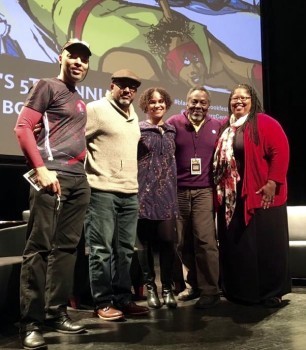 That one word sums up my weekend so far! Yesterday I was part of the kids program at the 5th Annual Black Comic Book Festival hosted by the Schomburg Center for Black Culture up in Harlem. My co-panelists (l-r: Jerry Craft, David Miller, Alex Simmons, and Deirdre Hollman) were great and I sat in the audience with the kids so I could see their slideshows and drawing demonstration. When it was my turn, I could only see the kids seated in the first ten rows—the glare of the spotlight made it hard to see all the others in the packed auditorium—but I could tell that they were paying attention and getting excited about Ship of Souls. Scholastic’s Jackie Carter Memorial Fund made it possible to send each child home with one of our books and I signed quite a few once the program ended. The kids also asked great questions about overcoming rejection and finding inspiration when the well runs dry…I always insist that I’m not a comics fan, but the comics community is so expansive that I always end up feeling right at home. I
That one word sums up my weekend so far! Yesterday I was part of the kids program at the 5th Annual Black Comic Book Festival hosted by the Schomburg Center for Black Culture up in Harlem. My co-panelists (l-r: Jerry Craft, David Miller, Alex Simmons, and Deirdre Hollman) were great and I sat in the audience with the kids so I could see their slideshows and drawing demonstration. When it was my turn, I could only see the kids seated in the first ten rows—the glare of the spotlight made it hard to see all the others in the packed auditorium—but I could tell that they were paying attention and getting excited about Ship of Souls. Scholastic’s Jackie Carter Memorial Fund made it possible to send each child home with one of our books and I signed quite a few once the program ended. The kids also asked great questions about overcoming rejection and finding inspiration when the well runs dry…I always insist that I’m not a comics fan, but the comics community is so expansive that I always end up feeling right at home. I 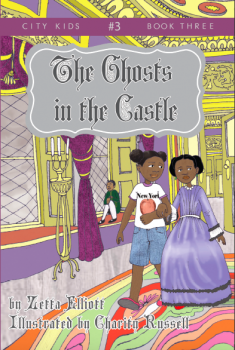 went back to Harlem today to catch the women creators’ panel but there was a line wrapped around the block! It was snowing and I’m pretty sure the panels are being filmed, so I headed back to Brooklyn. Sorry to miss it since there were no other women in the program, but it’s awesome that so many New Yorkers turned out in bad weather to participate in the festival. You can watch a news report here.
went back to Harlem today to catch the women creators’ panel but there was a line wrapped around the block! It was snowing and I’m pretty sure the panels are being filmed, so I headed back to Brooklyn. Sorry to miss it since there were no other women in the program, but it’s awesome that so many New Yorkers turned out in bad weather to participate in the festival. You can watch a news report here.
I got some great news last week: the Association of Children’s Librarians of Northern California (ACL) named Melena’s Jubilee an outstanding book for the month of December! And then today I read the first review of The Ghosts in the Castle over at Charlotte’s Library. Here’s a peek:
It’s a good story for any young (nine or tenish, I’d say) fantasy reader who loves ghosts and mysteries and castles. What makes it special is that Zetta Elliott is unapologetic about directly positioning both modern and historic characters of the African diaspora in a fantasy novel. She raises issues of colonialism, both its past and its present reverberations (including Zaria’s own family history), while keeping Zaria’s particular story going at a nice pace, so that the message doesn’t overwhelm the reading experience (in large part because Zaria is utterly relatable to any young Anglophile fantasy reader, and also in large part because it’s a neat ghost story).
The result is a fascinating, moving story that not only adds diversity to the genre but makes for good reading. It’s just the right length for older elementary grade readers; if you are older than that, you might be left wanting more (which isn’t a bad thing….)
This review means a lot to me for several reasons. Charlotte specializes in speculative fiction for kids and over the years she has reviewed several of my books, treating me like an author who is making a contribution to the field. Last week I looked up bloggers who focus on middle grade fiction and found this list; but when I checked their submission policies, I found that most of the bloggers refuse to consider self-published books. So it’s rare to find a blogger as open-minded as Charlotte, and then to have her “get” the book AND recognize my project—to center Black children in fantasy fiction—that’s the cherry on top!

